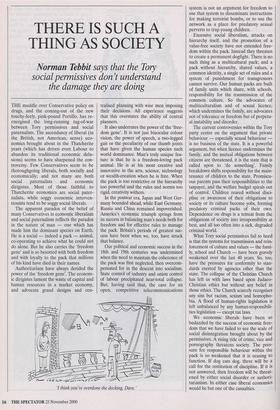THERE IS SUCH A THING AS SOCIETY
Norman Tebbit says that the Tory
social permissives don't understand the damage they are doing
THE muddle over Conservative policy on drugs, and the coming-out of the new touchy-feely, pink-pound Portillo, has re- energised the long-running tug-of-war between Tory permissives and social paternalists. The ascendancy of liberal (in the British, not American, sense) eco- nomics brought about in the Thatcherite years (which has driven even Labour to abandon its traditional economic delu- sions) seems to have sharpened the con- troversy. Few Conservatives seem to be thoroughgoing liberals, both socially and economically; and not many are both social paternalists and economic dirigistes. Most of those faithful to Thatcherite economics are social pater- nalists, while soggy economic interven- tionists tend to be soggy social liberals.
The apparent paradox of the belief of many Conservatives in economic liberalism and social paternalism reflects the paradox in the nature of man — one which has made him the dominant species on Earth. He is a social — indeed a pack — animal, co-operating to achieve what he could not do alone. But he also carries the 'freedom gene' and is so besotted with both freedom and with loyalty to the pack that millions of his kind have died in their names.
Authoritarians have always derided the power of the 'freedom gene'. The econom- ic dirigistes lament the waste of capital and human resources in a market economy, and advocate grand designs and cen- tralised planning with wise men imposing their decisions. All experience suggests that this overstates the ability of central planners.
It also underrates the power of the 'free- dom gene'. It is not just binocular colour vision, the power of speech, a two-legged gait or the peculiarity of our thumb joints that have given the human species such world dominance. Man's truly unique fea- ture is that he is a freedom-loving pack animal. He is at his most creative and innovative in the arts, science, technology or wealth-creation when he is free. When the pack is too restrictive or the hierarchy too powerful and the rules and norms too rigid, creativity withers.
In the postwar era, Japan and West Ger- many bounded ahead, while East Germany, Russia and China remained impoverished. America's economic triumph springs from its success in balancing man's needs both for freedom and for effective rules to manage the pack. Britain's periods of greatest suc- cess have been when we, too, have struck that balance.
Our political and economic success in the 18th and 19th centuries was undermined when the need to maintain the coherence of the pack was first neglected, then overcom- pensated for in the descent into socialism. State control of industry and union control of labour precipitated near-total collapse. But, having said that, the case for an open, competitive telecommunications I think you've overdone the decking Dave.' system is not an argument for freedom to use that system to disseminate instructions for making terrorist bombs, or to use the network as a place for predatory sexual perverts to trap young children.
Excessive social liberalism, attacks on hierarchy itself, and the promotion of a value-free society have not extended free- dom within the pack. Instead they threaten to create a permanent dogfight. There is no such thing as a multicultural pack; and a pack without hierarchy, shared values, a common identity, a single set of rules and a system of punishment for transgressors cannot survive. Our human packs are built of family units which share, with schools, responsibility for the transmission of the common culture. So the advocates of muliticulturalism and of sexual licence, which undermines the family, are advocates not of tolerance or freedom but of perpetu- al instability and disorder.
The current controversies within the Tory party centre on the argument that private behaviour — especially sexual behaviour is no business of the state. It is a powerful argument, but when licence undermines the family, and the mutual obligations between citizens are threatened, it is the state that is called upon to 'do something'. Family breakdown shifts responsibility for the main- tenance of children to the state. Promiscu- ous parents pass their responsibilities to the taxpayer, and the welfare budget spirals out of control. Children reared without disci- pline or awareness of their obligations to society or its culture become yobs, forming predatory criminal packs of their own. Dependence on drugs is a retreat from the obligations of society into irresponsibility at best, and all too often into a sick, degraded criminal world.
What Tory social permissives fail to heed is that the systems for transmission and rein- forcement of culture and values — the fami- ly, school and Church — have been gravely weakened over the last 40 years. So, too, have the pressures for conformity to stan- dards exerted by agencies other than the state. The collapse of the Christian Church has left us with laws based upon Judaeo- Christian ethics but without any belief in those ethics. The Church scarcely recognises any sins but racism, sexism and homopho- bia. A flood of human-rights legislation is left unbalanced by any human-responsibili- ties legislation — except tax laws.
We economic liberals have been so bedazzled by the success of economic free- dom that we have failed to see the scale of social disintegration brought about by the permissives. A rising tide of crime, vice and pornography threatens society. The pres- sure for responsible behaviour within the pack is so weakened that it is ceasing to function. If dog eats dog, there will be a call for the restitution of discipline. If it is not answered, then freedom will be threat- ened by either social disorder or authori- tarianism. In either case liberal economics would be but one of the casualties.





























































































 Previous page
Previous page